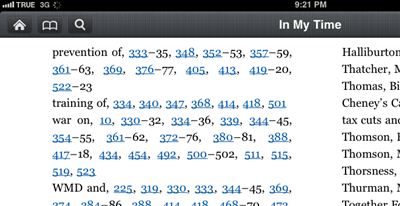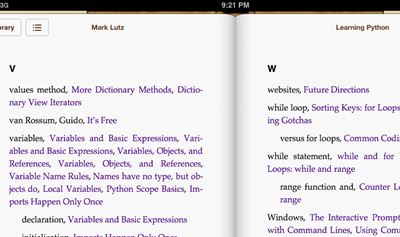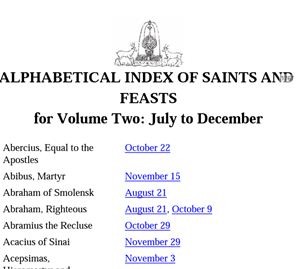Posted on 2012-Aug-29
The Trouble with Indexes
When it comes to publishing a non-fiction eBook, it’s no secret that there are many more challenges in terms of the internal design (hence the reason we charge more for the service at BB eBooks). This is probably why non-fiction has been slow to migrate away from dead tree books compared to fiction. It also doesn’t help the cause for non-fiction eBooks that the industry standard seems to be laying out the book for print in InDesign, and then figuring out how to turn the fixed-layout into a reflowable format that will be enjoyed by readers. Footnotes, floating images, and other complexities can be handled by someone who has a good understanding of HTML, but indexes present another problem entirely.
Page Numbers are Meaningless in an eBook
Indexes are incredibly useful for referencing specific information in a non-fiction book; although, they are usually created by referencing page numbers. Unfortunately, page numbers are completely meaningless in an eBook, as the number of “pages” can be altered simply by changing the size of the font or switching to a different eReading device. One way I’ve seen the big publishers do it is to take the page numbers and have some poor guy or gal manually insert hyperlinks on each page number.

The hyperlinks are a nice feature, but the page numbers are completely useless for this eBook version of Cheney’s biography. What to do about this conundrum?
A Better Way for Indexes
Instead of indexes referencing page numbers with the contents of the book, a better way is to reference the section. This works well if there are lots of sections, since the reader will be able to quickly pinpoint the information they are tracking down. Learning Python from O’Reilly Media adopts this approach and it’s very useful for a Python newbie to have a fully functional index:

One of our clients is Sebastian Press, the publishing arm of the Western American Diocese. They publish some very well laid-out and scholarly books. They asked us to convert a 500,000-word book and it had a very extensive index (over 1,000 entries). This type of eBook needs an index due to its scholarly nature that contains an abundance of information. Luckily, the index referenced sections: the book was divided into 365 sections, one for each day of the year. Therefore, we wrote a quick and dirty script to turn all those date entries in the index into hyperlinks to the actual section. Please have a look:

Likewise, indexing by section works great for the print edition of this book. Just to provide a quick note on the HTML, we usually put indexes in table format. Here is the markup for the picture above:
<table class="index_table"> <tr><td>Abercius, Equal to the Apostles</td><td><a href="content313.html#October_22_id">October 22</a></td></tr> <tr><td>Abibus, Martyr</td><td><a href="content338.html#November_15_id">November 15</a></td></tr> <tr><td>Abraham of Smolensk</td><td><a href="content249.html#August_21_id">August 21</a></td></tr> <tr><td>Abraham, Righteous</td><td><a href="content249.html#August_21_id">August 21</a>, <a href="content300.html#October_9_id">October 9</a></td></tr> <tr><td>Abramius the Recluse</td><td><a href="content320.html#October_29_id">October 29</a></td></tr> <tr><td>Acacius of Sinai</td><td><a href="content352.html#November_29_id">November 29</a></td></tr> <tr><td>Acepsimas, Hieromartyr and Bishop of Naeson, and others, Martyrs</td><td><a href="content326.html#November_3_id">November 3</a></td></tr> ...(many more) </table>
Our Advice on Indexes
So, if you would like our advice on how to make one effective index that will cover both the print and eBook edition, we kindly suggest referencing sections rather than page numbers. Save yourself the hassle of having to reconfigure everything for the eBook edition and give the readers something that enhances interactivity and searchability.
Label: Technical and Design
comments powered by Disqus